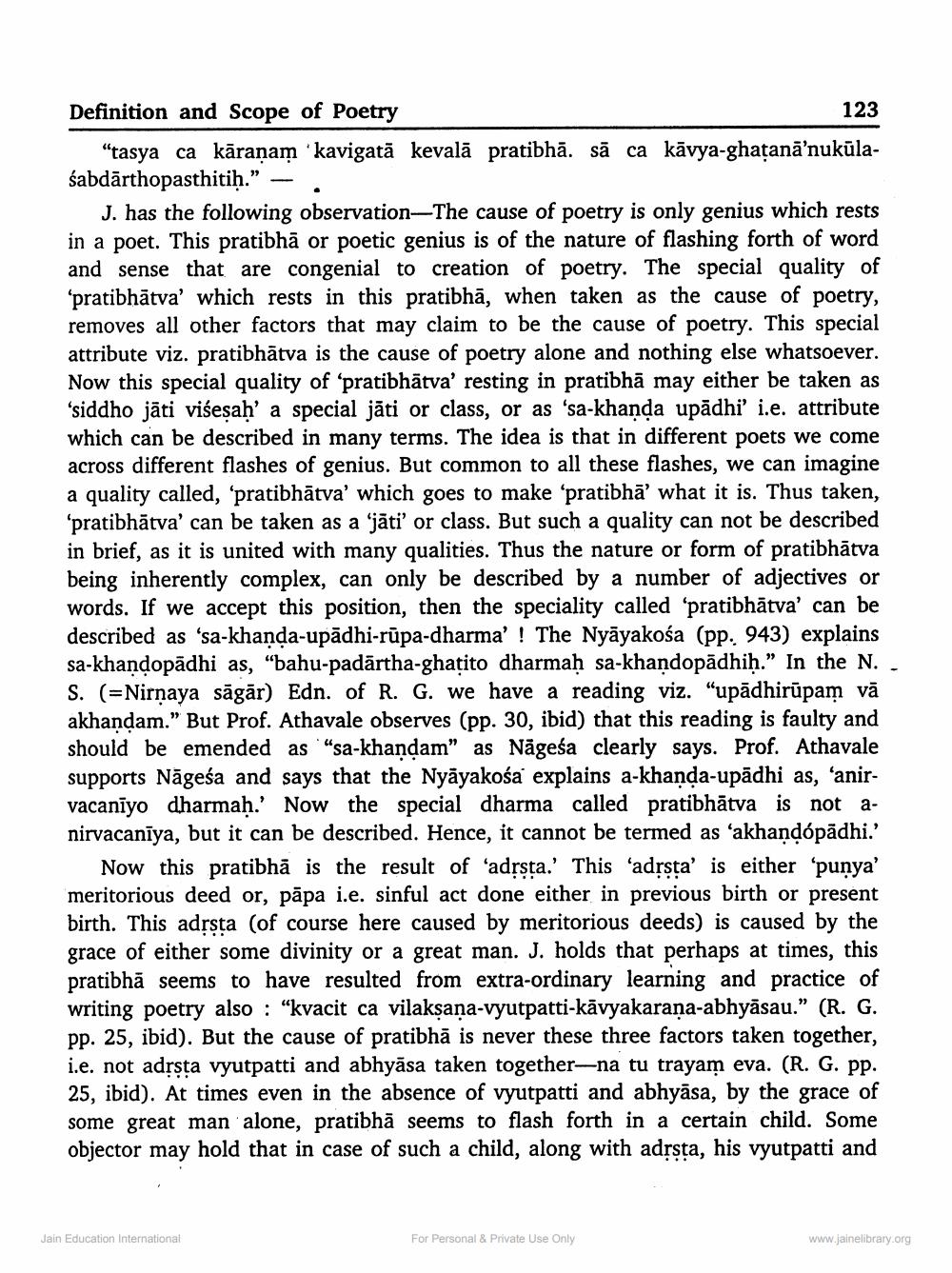________________
Definition and Scope of Poetry
123 "tasya ca kāraṇam 'kavigatā kevalā pratibhā. sāca kāvya-ghatanā’nukūlaśabdārthopasthitiḥ.” -
J. has the following observation—The cause of poetry is only genius which rests in a poet. This pratibhā or poetic genius is of the nature of flashing forth of word and sense that are congenial to creation of poetry. The special quality of ‘pratibhātva' which rests in this pratibhā, when taken as the cause of poetry, removes all other factors that may claim to be the cause of poetry. This special attribute viz. pratibhātva is the cause of poetry alone and nothing else whatsoever. Now this special quality of 'pratibhātva' resting in pratibhā may either be taken as ‘siddho jāti višesah a special jāti or class, or as 'sa-khanda upādhi' i.e. attribute which can be described in many terms. The idea is that in different poets we come across different flashes of genius. But common to all these flashes, we can imagine a quality called, 'pratibhātva' which goes to make 'pratibhā' what it is. Thus taken, 'pratibhātva' can be taken as a 'jāti' or class. But such a quality can not be described in brief, as it is united with many qualities. Thus the nature or form of pratibhātva being inherently complex, can only be described by a number of adjectives or words. If we accept this position, then the speciality called 'pratibhātva' can be described as 'sa-khanda-upādhi-rūpa-dharma' ! The Nyāyakośa (pp. 943) explains sa-khandopādhi as, “bahu-padārtha-ghatito dharmaḥ sa-khandopādhiḥ." In the N. -
=Nirnaya sāgār) Edn. of R. G. we have a reading viz. "upādhirūpam vā akhandam." But Prof. Athavale observes (pp. 30, ibid) that this reading is faulty and should be emended as "sa-khandam" as Nāgeśa clearly says. Prof. Athavale supports Nāgeśa and says that the Nyāyakośa explains a-khanda-upādhi as, 'anirvacanīyo dharmaḥ.' Now the special dharma called pratibhātva is not anirvacanīya, but it can be described. Hence, it cannot be termed as 'akhandópādhi.'
Now this pratibhā is the result of 'adrsta.' This 'adrsta' is either 'punya' meritorious deed or, pāpa i.e. sinful act done either in previous birth or present birth. This adrsta (of course here caused by meritorious deeds) is caused by the grace of either some divinity or a great man. J. holds that perhaps at times, this pratibhā seems to have resulted from extra-ordinary learning and practice of writing poetry also : "kvacit ca vilaksana-vyutpatti-kāvyakarana-abhyāsau." (R. G. pp. 25, ibid). But the cause of pratibhā is never these three factors taken together, i.e. not adrsta vyutpatti and abhyāsa taken together-na tu trayam eva. (R. G. pp. 25, ibid). At times even in the absence of vyutpatti and abhyāsa, by the grace of some great man alone, pratibhā seems to flash forth in a certain child. Some
may hold that in case of such a child, along with adrsta, his vyutpatti and
Jain Education International
For Personal & Private Use Only
www.jainelibrary.org




